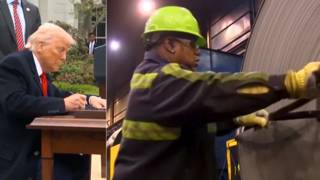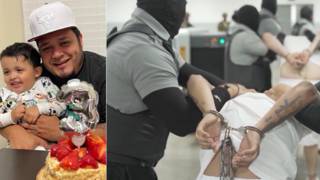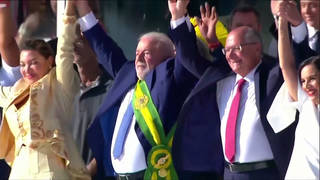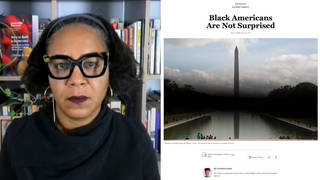
Brazilian President Luiz Inácio Lula da Silva is calling for phasing out fossil fuels but has alarmed many climate activists as Brazil moves to join the oil producer alliance OPEC+ as an observer state. Paula Vargas, director of the Brazil program at Amazon Watch, lays out Brazil’s environmental policy under Lula and Jair Bolsonaro’s legacy of impunity for those attacking environmental defenders. “Brazil has a big, big possibility of being the top leader in environmental change,” but civil society must push leaders around the world to enact climate solutions, Vargas says.
Transcript
AMY GOODMAN: This is Democracy Now! I’m Amy Goodman. We’re broadcasting from COP28 in Dubai, UAE. We end today’s show looking at Brazil’s plans to address the climate crisis. Here at COP, Brazilian President Luiz Inácio Lula da Silva called for a phaseout of fossil fuels.
PRESIDENT LUIZ INÁCIO LULA DA SILVA: [translated] Now is the time to face the debate about the slow-motion pace of the decarbonization of the planet and to work towards an economy that will be less reliant on fossil fuel.
AMY GOODMAN: But Brazil has also alarmed many climate activists over its plan to join the oil producer alliance OPEC+ as an observer state. This is Lula again.
PRESIDENT LUIZ INÁCIO LULA DA SILVA: [translated] Our participation in OPEC is for us to discuss with OPEC the need that rich oil-producing countries start investing part of their money in helping poor countries in the African continent, in Latin America, in Asia, to invest in nonfossil fuels. They can fund ethanol, biodiesel, wind energy, solar energy, green hydrogen. This is our role.
AMY GOODMAN: We’re joined now by Paula Vargas, Brazil program director at Amazon Watch.
We thank you so much for being with us. Why don’t you you start off by clarifying what is Lula, the Brazilian president’s stance right now?
PAULA VARGAS: We had a lot of expectations that Brazil president will be leading climate action towards a better planet. But what we saw here is a big contradiction. And Lula, in the one hand, it’s like delivering a lot of important speeches and announcements, but in the other one, his minister of mining and energy is praising the interests of OPEC+. So, it’s a big skeleton they are trying to hide, as, for instance, the attempt to open the Amazon to oil exploitation.
AMY GOODMAN: Were you encouraged by any stance? And do you think Lula can be moved? Also the question about encouraging oil drilling off-site, off coast?
PAULA VARGAS: There are reasons to be encouraged and hopeful, because it’s, in fact, possible for Lula to take this leadership role. It’s a fact that he arrived at COP delivering what he promised in terms of deforestation. And he pledged zero deforestation by 2030. He’s one of the most ambitious plans and president in trying to lead in NDCs towards the commitment of the Paris Agreement. He’s also very focused on the climate justice and bringing those that are more vulnerable to the table. He is receiving Indigenous leaders and working with them towards this. So, yes, in two years, Lula can be supported — not only pressured, but supported — to take this leadership role.
AMY GOODMAN: Talk more about what Bolsonaro did, his targeting of the rainforest, and how much further Lula has to go.
PAULA VARGAS: It’s a sad thing to say that in four years Bolsonaro has really created and opened the Amazon for a lot of illegal activities. He had given the sense of impunity, and now we have transborder crime going stronger. We have people defying the government. Even after Lula took the invaders from the Yanomami territory, now they are back and defying the police and fighting them. So, what Bolsonaro did was unprecedented in terms of, like, helping those illegal loggers, illegal minings and farmers to get to the Amazon as the new frontier and a lawless frontier.
So Lula has a big challenge, first, to try to get better condition — give better condition to the environmental agencies. They are now trying to do the work, so they need funds, they need people, because it was dismantled. But it’s proof that it can be done. It was done before, when Lula was president and Marina was the minister, and they were able to reduce deforestation 82%. Now, in only one year, they have been able to do this. Almost they arrived before, almost 49% of deforestation. So, yes, it can be done, and he is moving towards it.
But we also have to understand and be attentive for what they are calling sustainable progress economy, because he’s talking about bioeconomy. But there are a lot of people that thinks that that means more mining. And mining, the model that exists now, it’s not sustainable. So, Brazil can give — can be in the leadership of renewable energy and can think and have a different progress, if they work with communities towards, for instance, regionality of agriculture, and not agribusiness, not cattle, not big industrial monoculture, because people are hungry. Like, we need food. And farmers can also be part of the development, right? So Brazil has a big, big possibility of being the top leader in environmental change. And we do believe that we have two years to prove that.
AMY GOODMAN: Latin America is the deadliest region for environmentalists. Who’s behind the murders?
PAULA VARGAS: It’s not a simple question, because we have been seeing how crime are a big network of actors. We have from, for instance, the community poor people. They are working as illegal loggers and illegal fishermen, because they need to survive. But they are part of then a big chain that are doing the — like, taking this fish, but working with illegal loggers, and then the illegal miners come. And in the four years of Bolsonaro, what we happen is the big cartel. The drug cartel are now working transborder between, like, the Peru, Colombia, Brazil, Venezuela. And just recently Amazon Watch released a big important report, “Amazon Underworld,” where there’s this, like, showing off.
And it’s also important to understand that the solution is not simple. We just don’t need more militarization or not putting the army or police, police reinforcement. The only solution needs to happen to take them, but if we don’t bring solutions — there are social solutions — work with the community, economic solutions, there will be just another war. And we don’t need more war.
AMY GOODMAN: What do you want to see come out of U.N. COP28, where we are right now?
PAULA VARGAS: I want to see people to believing that COP can be a place for big discussions and to give hope and unite movements, not the big business expo that it’s becoming right now.
AMY GOODMAN: The significance of Al Jaber, Dr. Al Jaber, being the president of the COP and also the head of one of the largest oil companies in the world?
PAULA VARGAS: Yeah, that is like the —
AMY GOODMAN: And the lobbyists, about 2,500 of them, we’ve never seen anything like this at any COP.
PAULA VARGAS: Yeah. We also now saw like what we saw since Egypt, right? It’s like, why those two COPs are happening in those places? And I think, like, because of this and because of the carbon capture, the fossil fuel capture happening, instead of giving us less hope, should, like, push civil society and movements and journalists towards putting more effort to make Brazil COP a different one. Again, like, we have to understand loss and damage will never happen without pressure of the civil society. It’s not in their interest to send them money. And there were money announced. It’s not enough, but it’s announced. So, we have to maybe believe that U.N. and COP could be a place that we can still bring politicians together to discuss the better world, but it will not happen without our pressure, your work and our work as civil society and more. We have to organize transnational, global movement so that together we can push our governments toward the right path.
AMY GOODMAN: Well, I want to thank you so much for being with us, Paula Vargas, Brazil program director at Amazon Watch. In the coming days, we’ll be broadcasting an interview with Brazil’s first Indigenous peoples minister and the first Indigenous women’s peoples minister.
That does it for our broadcast. A very special thanks to our team here in Dubai, to Nermeen Shaikh, María Taracena, Hany Massoud, Tey-Marie Astudillo, Denis Moynihan, here in the UAE, as well as the AP team — Rania Khadr and Julian Jones, Pablo Delbracio, David Iacolucci, Tobin Shackleford, Zoran Janković, Joseph Mark Dilema, Salma Wally [phon.] and Rawan Kassem [phon.].
Oh, this Saturday, I’ll be moderating the Belmarsh Tribunal with journalist Ryan Grim at the National Press Club at 2 p.m. on Julian Assange and the Biden administration’s crackdown on free speech and the First Amendment. You can watch the live stream at Democracy Now!'s YouTube channel. That's Saturday at 2 p.m. Eastern time.
Democracy Now! is produced with Mike Burke, Renée Feltz, Deena Guzder, Messiah Rhodes, Tami Woronoff, Charina Nadura, Sam Alcoff, John Hamilton, Robby Karran, Hany Massoud and Sonyi Lopez. Our executive director is Julie Crosby. I’m Amy Goodman, with the whole team here in Dubai, UAE.












Media Options